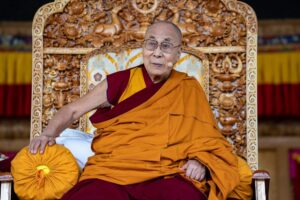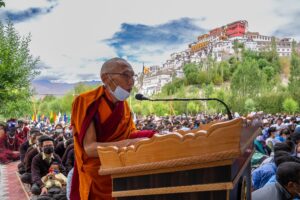
Photo: OHHDL
His Holiness the Dalai Lama addressed 3,000 students from 15 schools and colleges in and around Leh, the capital of Ladakh during his visit there this month. The students gathered in the teaching ground of the newly built Thiksey Library and Learning Centre at Thiksey Monastery where His Holiness had been requested to consecrate the new Library and Learning Centre, reports the official website of His Holiness the Dalai Lama.
His Holiness said that he was touched by the genuine love and affection shown to him by the people of Ladakh and thanked them all and added how happy he was to be able to visit Ladakh again. He continued, “I very much appreciate the harmony that pervades the Ladakhi community”.
“Whether we belong to one ethnic group or another, and whether we practise this religion or that, we are all essentially the same as human beings” said His Holiness. “From the moment of birth, when our mothers take care of us, until we breathe our last, we are all the same. Therefore, it’s in the interest of us all to live in peace and harmony […] Whether we have faith in religion or not, the benefits of warm-heartedness can be taught as part of training in secular ethics”.
His Holiness stressed that ahimsa – doing no harm, karuna – compassion and warm-heartedness are key factors to living a happy life and that this indirectly contributes to creating a happier world at large. He recalled the hardwork of the Tibetan Kings who developed Tibetan writing modeled on the Indian Devanagari alphabet, saying that this in turn made it possible for the translation of Indian Buddhist literature into the Tibetan language. He explained that there are over 300 volumes of the Kangyur and Tengyur (a collection of Buddhist texts recognised by various school of Tibetan Buddhism), and that to study them, Tibetan remains the most accurate language.
He finished by saying, “Another point I want to share with you is that global warming is becoming a really serious problem. One of the positive steps we can take to counter it is to plant and care for trees. In this context it’s wonderful to see so much greenery here at Thiksey. The Indian environmental activist Sunderlal Bahuguna gave me the task of reminding people in the Himalayan region how important this is. I promised I would, so please plant and take care of trees wherever and whenever you can”.
His Holiness then answered some questions from the audience.

Thiksey Rinpoche
Photo : OHHDL
Thiksey Rinpoche lauded the Tibetan spiritual leader’s commitment to the promoton ofhumanvalues, encouraging inter-religious harmony, preserving Tibetan religion and culture and protecting Tibet’s natural environment, as well as his efforts towards creating greater awareness and interest in ancient Indian knowledge. He described these efforts as beneficial and relevant in today’s world.
Thiksey Rinpoche reported that since the new Library and Learning Centre became operational in 2020, 350 students have been given training on secular ethics through the Social, Emotional, and Ethical Learning (SEE Learning) programme. He said that the centre also gives tuition to many students during the winter when schools are closed.




 Print
Print Email
Email